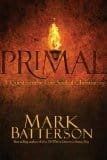Review: Primal


Mark Batterson, lead pastor of National Community Church in Washington, DC, wants a reformation.
Our generation needs a reformation.
But a single person won’t lead it.
A single event won’t define it.
Our reformation will be a movement of reformers living creatively, compassionately, courageously for the cause of Christ.
This reformation will not be born of a new discovery. It will be the rediscovery of something old, something ancient.
Something primal.
What’s he talking about? The Great Commandment – what he calls the Primal Commandment. “Love the Lord your God with all your heart and with all your soul and with all your mind and with all your strength” (Mark 12:30).
So far so good. Batterson uses this command to talk about four areas: the heart (compassion), the soul (wonder), the mind (curiosity), and strength (energy or service) of Christianity. “We’ve got to be great at the Great Commandment,” he writes “Anything less isn’t good enough.” The last Reformation was about Sola fide (faith alone). The rallying cry of the next reformation, he says, is Amo Dei, which means “Love God.”
Here’s what I liked: this is an easy read, with lots of good illustrations and some good challenges. Batterson is clearly a skilled communicator, and he says lots of things that are true.
But I also had some concerns. Was Jesus really giving us a four-point outline? I don’t think so. He mentions four good areas, but I’m not sure we’re supposed to split Jesus’ statement apart this way. The fourfold command is a call to love God completely.
I’m also not sure that loving God with our heart translates is the same thing as having compassion for others. This seems to be a necessary implication of loving God, but not the same thing.
At one point Batterson uses Joseph as an example of someone who lacked emotional intelligence (EQ) and therefore was not compassionate. Later, Joseph increased his EQ and was used by God, which is good because it led to the salvation of two nations and the unfolding of God’s redemptive plan. At one level, I suppose this is true, but it seems to trivialize the story of Joseph, which is not about improving our emotional intelligence or compassion. This type of thing happens a few times. You can’t argue against emotional intelligence, but is that really the point of the story?
Mostly, though, I would have liked to have seen more reminders that the Great Commandment is a summary of the Law. Paul has all kinds of things to say about the Law. We may need a new reformation, but it sure isn’t a reformation of trying to keep the Law better. There’s gospel in this book, but it’s not the focus of this book. I’m all for the Great Commandment, of course, but we need to remember that the Law condemns us, restrains us, and provides a guide for how to live as believers, but it sure doesn’t save us. It’s shows us our need for the gospel, and tells us how we should live in response, but it’s sure not our hope.
I don’t like writing this review. I want to like this book, and it is fun to read. It says lots of true things. But I was hoping for more. It’s getting good reviews at Amazon, but I have some reservations.
This book was provided for review by the WaterBrook Multnomah Publishing Group.
Read more at Amazon.com | WaterBrook Multnomah






